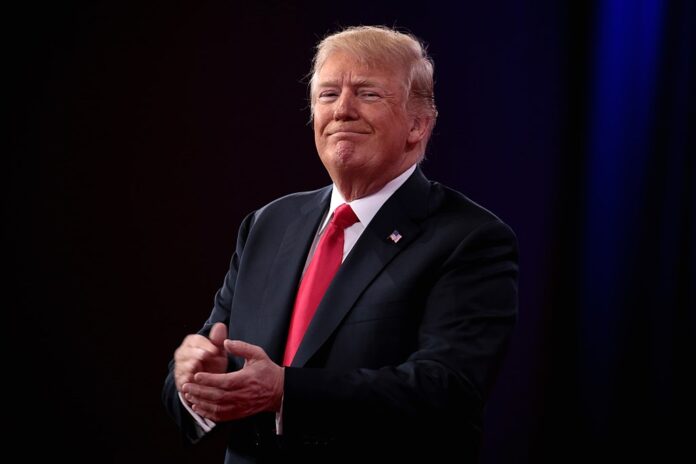Former President Donald Trump’s first rally on Long Island attracts tens of thousands, focuses on immigration, and is marked by heightened security measures and a counter-protest
Former President Donald Trump ignited a fervent crowd at Nassau Coliseum in Uniondale, Long Island, during his first campaign rally on the island Wednesday night. Addressing a venue packed with supporters, Trump underscored his alarmist immigration rhetoric, calling for drastic measures and highlighting his frustration with Democratic leadership in New York.
Trump’s speech, heavily focused on immigration, was a rallying cry for his base. He condemned what he described as deteriorating conditions under Democratic governance, criticizing the state’s handling of homelessness and subway safety. “We’re just destroying the fabric of life in our country,” Trump declared. “You got to get rid of these people. Give me a shot,” he urged the audience.
The former president’s promises included a pledge for “the largest deportation operation in the history of our country,” though he provided no specifics on how this would be executed. Trump portrayed New York as a state in crisis, with businesses fleeing and public resources strained by what he referred to as an influx of illegal migrants.
Embed from Getty ImagesThe rally, which drew more than 60,000 ticket requests despite the Coliseum’s 16,000-seat capacity, showcased Trump’s strong support base. Enthusiastic supporters began gathering at the venue as early as 11 hours before the event. Many who couldn’t get inside stayed nearby, watching the rally on large screens set up outside.
“It’s wonderful because of the camaraderie,” said Pam Wissmann, a Trump supporter. “It doesn’t matter if you’re Black, you’re white, you’re Asian or Latino, it’s just everybody coming together.”
However, the event was not without controversy. Outside the Coliseum, a counter-protest organized by Haitian American community members criticized Trump’s rhetoric, accusing him of turning patriotism into “hatriotism.”
The rally also followed a tense weekend in Florida, where Trump narrowly escaped a second apparent assassination attempt. This context heightened security around the event. NewsCopter 7 captured images of the substantial security presence, as law enforcement worked to address rumors of explosives. Nassau County Police Commissioner Patrick Ryder clarified that a person detained near the rally site, who was reportedly involved in bomb detection training, was a civilian and not affiliated with the event. Ryder and other officials worked to dispel false social media claims about explosives.
Trump’s next campaign stop is planned for Springfield, Ohio, where he has previously made controversial claims about the local Haitian community. Despite the challenges, the rally demonstrated Trump’s enduring appeal and his ability to draw significant crowds, emphasizing immigration as a central issue in his campaign.
Analysis:
Political:
Trump’s rally on Long Island highlighted the central role immigration plays in his campaign strategy. His rhetoric, which emphasizes drastic actions and blames current leaders for societal issues, resonates with a significant portion of his base but exacerbates partisan divides. The event underscored Trump’s ability to mobilize large crowds and maintain a high profile in the political arena. His criticism of Democratic leadership and promises of radical changes in immigration policy reflect a broader strategy to consolidate his support by framing current conditions as a crisis needing urgent intervention.
Social:
The rally’s significant turnout and enthusiastic support highlight a broader social divide on issues of immigration and governance. Trump’s focus on immigration and his critique of the current state of public services resonate with his supporters’ concerns about national and local security. However, the counter-protest by the Haitian American community illustrates the deep social tensions and the impact of Trump’s divisive rhetoric on minority groups. The contrast between the fervor of Trump’s supporters and the opposition reflects ongoing societal debates about race, immigration, and political discourse.
Racial:
The rally and subsequent counter-protest underscore the racial dimensions of Trump’s campaign rhetoric. His comments about immigrants and their impact on public resources feed into broader racial and ethnic anxieties, affecting how different communities perceive and respond to his policies. The Haitian American counter-protesters’ response to Trump’s remarks highlights the racial implications of his immigration stance and the sense of exclusion felt by minority communities.
Economic:
The economic implications of Trump’s rally are significant. His focus on immigration as a drain on public resources taps into economic anxieties among his supporters, framing immigration as a key issue impacting the state’s economic health. The rally’s massive turnout and the enthusiasm of Trump’s base indicate strong support for his economic policies, which promise sweeping changes to address perceived economic problems. The controversy surrounding the rally and the heightened security also reflect the broader economic context of Trump’s campaign, including the costs associated with heightened security measures and the economic impact of political polarization.
